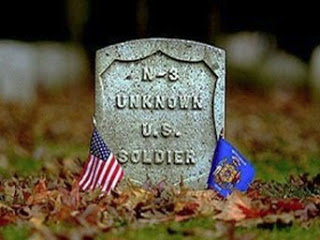Remembrance.

In the spring of 1866 the Ladies Memorial Association of Columbus, Georgia passed a resolution to set aside one day annually to memorialize the Confederate dead. Additionally, the secretary of the association, Mrs. Charles J. (Mary Ann) Williams was directed to author a letter inviting the ladies in every Southern state to join them in the observance. The letter was written in March of 1866 and sent to all of the principal cities in the South . . . The date for the holiday was selected by Mrs. Elizabeth Rutherford Ellis. She chose April 26, the first anniversary of Confederate General Johnston's final surrender to General Sherman at Bennett Place, NC. For many in the South, that marked the official end of the Civil War.
On April 26, 1866, tens of thousands of Southern women commemorated the first Confederate Memorial Day. Some, however, in the northernmost portions of the South did not participate because their flowers were not yet in bloom. Consequently, they selected dates later in the spring to hold their first Confederate Memorial Days. For example, parts of Virginia chose May 10, commemorating Stonewall Jackson's death. Near Petersburg, VA, they chose June 9, the anniversary of a significant battle there. Others opted for Jefferson Davis' birthday, June 3.
To the present, Southern states continue to have Confederate Memorial days. Though most are still on April 26, others continue to be later in the year.
In 1868, General John A. Logan, who was the commander in chief of the Union Civil War Veterans Fraternity called the Grand Army of the Republic (GAR), launched the Memorial Day holiday that is currently observed in the entire United States. According to General Logan's wife, he emulated the practices of Confederate Memorial Day. She wrote that Logan "said it was not too late for the Union men of the nation to follow the example of the people of the South in perpetuating the memory of their friends who had died for the cause they thought just and right." -- Wikipedia.
Here in Alabama both Confederate & Yankee memorial days are taken as a holiday by state employees, although not much memorializing gets done. It is more generally "celebrated" with the conspicuous backyard consumption of pig meat and beer. This occurs in a country and a state which falsely prides itself on being more patriotic than anyplace else. For myself, I have always marked both -- and not with a barbeque.
Other countries and peoples have their own memorial days: the Brits and their Commonwealth countries have Rembrance Day on 11 November, marking the end of the "Great War" with the wearing of poppies, inspired by the poem In Flanders Fields. The Germans have Volkstrauertag, celebrated on the second Sunday before Advent in mid-November. The Israelis have Yom Hazikaron in early April, just before their independence day observances and, of course, Yom Hashoa, Holocaust Remembrance Day, which this year was noted on 8 April.
Culture is transmitted by the collective memory of its people. A people without a memory of who they are and where they came from -- a people without a history -- will soon cease to exist. Collective memory is, of course, not the same as collectivist memory, which serves the ruling elites of whatever party is in power. Orwell's description of the Memory Hole is a classic representation of this process.
Today, we are faced with government-run "schools" whose entire function seems to be the consignment of the Founders' Republic -- and all the sacrifices that were required over the centuries to establish and maintain it -- down the memory hole of the collectivism that animates this so-called "public education."
All the more important, then, for those of us who understand this subversive process to do what we can with our children, our families and our friends to mark and maintain the memory of those who sacrificed to defend the Republic -- and, in the process, to transmit the reasons for their sacrifices.
In Flanders fields the poppies blow
Between the crosses, row on row,
That mark our place; and in the sky
The larks, still bravely singing, fly
Scarce heard amid the guns below.
We are the Dead. Short days ago
We lived, felt dawn, saw sunset glow,
Loved and were loved, and now we lie
In Flanders fields.
Take up our quarrel with the foe:
To you from failing hands we throw
The torch; be yours to hold it high.
If ye break faith with us who die
We shall not sleep, though poppies grow
In Flanders fields.

2 comments:
In the former USSR Victory Day (9 May, end of W.W.II for them) is taken very seriously (or at least it still was ten or so years ago when I was there). I saw teens and people in their twenties go up to veterans and thank them, and people born long after the war sometimes became pretty emotional talking about it.
When they asked me how we remember these events back in the States I was embarrassed, and I now try to commemorate Memorial Day and other such days appropriately.
Thanks for this reminder.
The National Decoration Day was inspired by Mrs. Logan's visit to South carolina to see what his lady was doing: http://www.petersburgexpress.com/MemorialNoraStory.html
Miss Nora gets the credit for starting "Memorial Day'.
Post a Comment